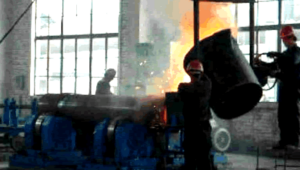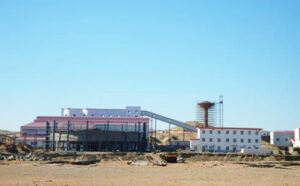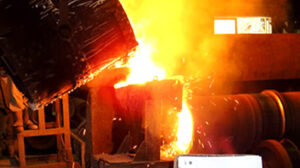Our team is highly trained and experienced in servicing and producing all types of steel supplies. Need help or have a question?
sales@abrasionresistantpipe.com
Tel.: +8621-3378-0199

The bimetal wear-resistant pipeline is composed of 2 layers of metal, the outer layer is generally Q235 ordinary steel pipe, and the innerHigh chromium alloy, Optional welding and cutting, Bimetallic Lined With High Chrome Alloy Pipe high wear resistance and heat resistance.
Please send your inquiry by sales@sunnysteel.com
As we all know, Bi-metal wear-resistant elbow for supply and marketing is composed of outer steel pipe and inner lining of high chromium alloy. The material of Bimetal Clad Pipe outer steel pipe can be Q235 or stainless steel. The material of Lined With High Chromium Bimetal Composite Pipe is chromium (Cr ) elements can be customized according to customer requirements, the scope of customization: Cr15-Cr30, the higher the content, the more wear-resistant Bimetallic Composite Pipe, and the higher the price
The bimetal wear-resistant pipeline is composed of 2 layers of metal, the outer layer is generally Q235 ordinary steel pipe, and the inner High chromium alloy, Optional welding and cutting, Bimetallic Lined With High Chrome Alloy Pipe high wear resistance and heat resistance.
Special Corundum ceramics made of rare metal oxides as solvents and sintered at high temperature by 1730 ℃ through bonding, welding, mosaic, riveting and socket technology, a variety of wear-resistant ceramic pieces, block brick materials in the pipe wear surface, so as to form a surface with excellent wear resistance, and the matrix is still using the composite pipe of ordinary metal.

It not only satisfies the special requirements, but also saves costs.
In a clad line pipe, the corrosion-resistant alloy forms a complete barrier layer on the internal surface of carbon or low-alloy steel pipe (usually referred to as the “backing steel”). In general, use of clad or bi-metal-lined pipe allows the economic use of expensive CRA materials,It has been widely concerned and used in many other fields abroad.
The wear resistance of the high-chromium bimetallic lined pipe is at least many times that of ordinary steel pipes. The bimetallic composite steel pipe has inner and outer double layers of metal, the inner lining is made of wear-resistant cast iron, the inner lining material has good wear resistance and corrosion resistance, and the outer layer material has high mechanical strength and high impact resistance. The lost foam composite process is directly adopted, and the metallurgical composite is formed by casting, which is safe and reliable to use.
Lined high-chromium bimetallic composite pipes include high-chromium bimetallic composite straight pipes lined, high-chromium bimetallic composite elbows lined, high-chromium bimetallic composite tee lined, Lined with high-chromium bimetal composite multi-pass, lined with high-chromium bi-metal composite reducer, lined with high-chromium bi-metal composite flash buffer device, etc.
| Flexure Strength | Tensile Strength | Elongation | Cross Section Stretch Ratio | Impact Toughness | Hardness of Wearable Layer | Hydrostatic Testing Pressure |
|---|---|---|---|---|---|---|
| MN/㎡ | MN/㎡ | % | % | J/c㎡ | HRC | Mpa |
| >610 | >700 | 5 | 5.1 | >15 | >38 | 5.6-12.9 |
Bimetal wear resistant products including: double metal wear-resisting straight pipe and double metal wear-resisting bend, double metal wear tee, double metal wear resistance reducer adopts the pipe fittings such as vacuum suction casting composite process, its advanced technology, effectively solve the problem of the bent pipe cannot be composite, bending and other various special-shaped pipe can do the whole compound, don’t change the material flow in the pipe bending trajectory, reduce resistance material conveying.
The outer wall of the centrifugal pipe is made of carbon steel, which ensures that the bimetal wear-resistant pipe has high mechanical strength and impact resistance.The inner lining wear resistance layer adopts the anti-wear alloy steel series independently developed by our company. The steel mainly adds alloy such as cr-ni-mo-cu-re and so on. Through the tempering heat treatment process, the alloy steel has strong wear resistance and corrosion resistance, high mechanical strength and impact resistance.
The whole set of process of our factory is the first in China, which fills the blank of anti-corrosion and wear-resistant industrial pipeline in China and has reached the international advanced level. It has been widely used in mining, metallurgy, coal, electric power and other industries, and is an ideal wear-resistant pipeline.
 (1) centrifugal casting technology enables the molten steel to solidify and form under the gravity condition, which is dozens of times higher than conventional casting. It solves the problem of loose inside the casting tube billet, has high metal density, and has good discharge and exhaust effect.
(1) centrifugal casting technology enables the molten steel to solidify and form under the gravity condition, which is dozens of times higher than conventional casting. It solves the problem of loose inside the casting tube billet, has high metal density, and has good discharge and exhaust effect.
(2) the size accuracy of centrifugal cast pipe is high and the wall thickness is even, which provides a favorable guarantee for the size accuracy of subsequent processed products.
(3) centrifugal casting process has high flexibility for the production of steel pipes of small batch, multiple varieties and specifications, high quality and high value-added steel.
What is CRA Cladding?
CRA basically means corrosion resistant alloy.
It’s a material that is built for cladding because its main purpose is to enhance a pipe’s resistance to corrosion.
What is Elbow Cladding?
Pipe elbow cladding is the process of applying a cladding material to elbow pipes.
It’s done on a more careful manner than the usual.
This is because elbow pipes can change throughout the entirety of the process.
Where Can Pipe Cladding be Applied to?
Particularly, the process of pipe cladding benefits the oil and gas industry the most.
However, it can also be used by other industries such as:
What is Pipe Lining?
Pipe lining is the process of prolonging the lifespan of pipes.
It can also be used, however, to restore a pipe from natural damages such as:
Lined Pipes vs. Clad Pipes
Pipe lining and pipe cladding are processes that are far from each other.
Lining is the process of mechanically bonding materials to pipes for restoration. Some of the uses of pipe lining include:
Cladding is the procedure of metallurgical bonding of clad materials to pipes. Some of the major uses of pipe cladding include:
Who Can Help You With Pipe Cladding?
There are a lot of companies that utilize state-of-the-art pipe cladding equipment.
We have cutting-edge technology that can complete projects ahead of time.
Some of the most notable features that our pipe cladding equipment have include:
Because oil and natural gas contains a large amount of corrosive media such as hydrogen sulfide, carbon dioxide and chloride ions, especially the content of corrosive components in the oil and gas medium before pipeline purification in the seabed oil and gas field is high, and some even require heat transfer, and internal corrosion problems are very prominent. The use of stainless steel or corrosion-resistant alloys in large quantities is not economical. Double metal clad pipes are a good choice.
The bimetal clad pipe structure uses a corrosion-resistant alloy tube (stainless steel or corrosion-resistant alloy) as the inner liner (wall thickness 0.5-3mm) to contact the corrosive medium and carbon steel or low-alloy steel as the outer base pipe to withstand the pressure. low. Generally, the double-metal clad pipe contains 316L austenite stainless steel as the inner liner in the case of containing CO2 medium, and 2205 and 2505 duplex stainless steel can be used as the medium containing CO2 + small amount of chloride, when H2S+CO2 is contained. + Chloride, the inner liner should be 028, G3, INCONEL625 and Inconel825 nickel-base or iron-nickel alloy, in order to ensure the corrosion resistance of the pipeline, but also can choose the titanium alloy and other materials with excellent corrosion resistance as lining. The outer layer material is usually API 5L X42, X50, X60, X70, ASTM-A106GB and A335-P22 and other materials, so as to ensure the strength of the pipeline.
Casing pipe for oil and gas transportation
Choosing stainless steel such as Incoloy625 and Incoloy825 for inner tubes to ensure the corrosion resistance of the pipe. The outer pipe are usually X42, X50, X60, X70, A335-P22 and other materials to ensure the strength of the pipeline. The American Petroleum Association (API) has developed the standard for composite pipes for pipelines, with the serial number API 5LD:Cr-Mo steel, super 13Cr, G3, C028 and other oil well tubes and the nickel-base alloy cladding tubes such as 825, 028.
Waste incinerator
Cladding steel tube for waste incinerator.The outer tube can be made of Sanicro65 alloy, and the inner pipe may be carbon steel or chromium, molybdenum steel with resistance to stress corrosion cracking.Europe and the United States have used 2 million meter composite steel pipe since the first installation cladding pipe incinerator superheater and water wall tubes in the 1971.
Heat exchanger
Cladding steel pipe used for heat exchanger should also have good thermal conductivity and a certain strength and corrosion resistance. We manufactured cladding pipe with high alloy, nickel chromium alloy 800 as the inner tube and the low-alloy steel ASTM A213 Ti2 as the outer pipe.
Used for wear-resistant steel
A Japan company have made cladding steel pipe with SUS316L corrosion resistant steel for outer pipe, Stellite No12 alloy for inner pipe,after 4 years is still new. They has also been well applied in the pneumatic conveying pipe of other micro powder particles, and the demand is increasing.
Marine environment
Cladding pipe used for marine environment made by Japan’s Kawasaki is widely used as marine heat exchanger tube and seawater desalination of seawater intake pipe.
 Civil areas
Civil areas
Cold, hot water pipes, direct drinking water pipes, heating, solar energy, ground source heat pump; civil construction water supply pipes, water distribution trunk; air conditioning circulation pipe, fine decoration high-grade commercial housing water pipes.
Industry
Oil and gas pipeline, oil and gas wells casing, sewage return pipe; chemical heat exchanger tube bundle; power desalination water, desulfurization pipeline and other metallurgy, desalination, medicine and chemical industry, sewage treatment, new energy, food processing and other industries.

High chromium cast iron is the third generation of white cast iron developed from ordinary white cast iron and hard nickel cast iron.
The bimetal wear-resistant tube inner wall KMTBCr28 has stable quality and good comprehensive performance. Adding a certain amount of rare earth elements can improve the alloy quality of steel, refine the grain and form a protective film on the surface.A certain amount of Mo was added to make the alloy have certain antioxidant effect and increase service life at high temperature.A certain amount of boron carbide can be added to control the hardness in the range of HRC45 ~ 65, and solve the contradiction between the hardness and weldability of wear-resistant steel.
The inner and outer surface of bimetal wear-resistant elbow should be smooth and clean, without burrs, burrs, cracks, loose, pores or bubbles;The inner wall of the wear-resisting elbow should be smooth without accumulated powder.The bend should have good thermal shock resistance. When there is a sharp change in temperature or welding connection, the inner layer of the wear-resistant pipe will not break and spalling due to the expansion or contraction of the inner layer.The dimensional deviation shall meet the requirements of product drawings and order, agreement, and shall meet the provisions of GB3092, GB8162 and GB8163 without special requirements.The thickness deviation of lining is + / – 1.2mm.
| Grade | C | Mn | Si | Ni | Cr | Mo | Cu | P | S |
|---|---|---|---|---|---|---|---|---|---|
| KmTBCr12 | 2.0-3.3 | ≤2.0 | ≤1.5 | ≤2.5 | 11.0-14.0 | ≤3.0 | ≤1.2 | ≤0.10 | ≤0.06 |
| KmTBCr15Mo | 2.0-3.3 | ≤2.0 | ≤1.2 | ≤2.5 | 11.0-18.0 | ≤3.0 | ≤1.2 | ≤0.10 | ≤0.06 |
| KmTBCr20Mo | 2.0-3.3 | ≤2.0 | ≤1.2 | ≤2.5 | 18.0-23.0 | ≤3.0 | ≤1.2 | ≤0.10 | ≤0.06 |
| KmTBCr26 | 2.0-3.3 | ≤2.0 | ≤1.2 | ≤2.5 | 23.0-30.0 | ≤3.0 | ≤1.2 | ≤0.10 | ≤0.06 |
Need to inquire about our products? Fill out the form below and our staff will be in touch!
Q: How long is your delivery time?
A: The delivery time of customized products is generally 25 35 days, and non customized products are generally shipped within 24 hours after payment.
Q: Do you provide samples? Is it free?
A: If the value of the sample is low, we will provide it for free, but the freight needs to be paid by the customer. But for some high value samples, we need to charge a fee.
Q: What are your payment terms?
A: T/T 30% as the deposit,The balance payment is paid in full before shipment
Q: What is the packaging and transportation form?
A: Non steaming wooden box and iron frame packaging. Special packaging is available according to customer needs. The transportation is mainly by sea.
Q: What is your minimum order quantity?
A: There is no minimum order quantity requirement. Customized products are tailor made according to the drawings provided by the customer.